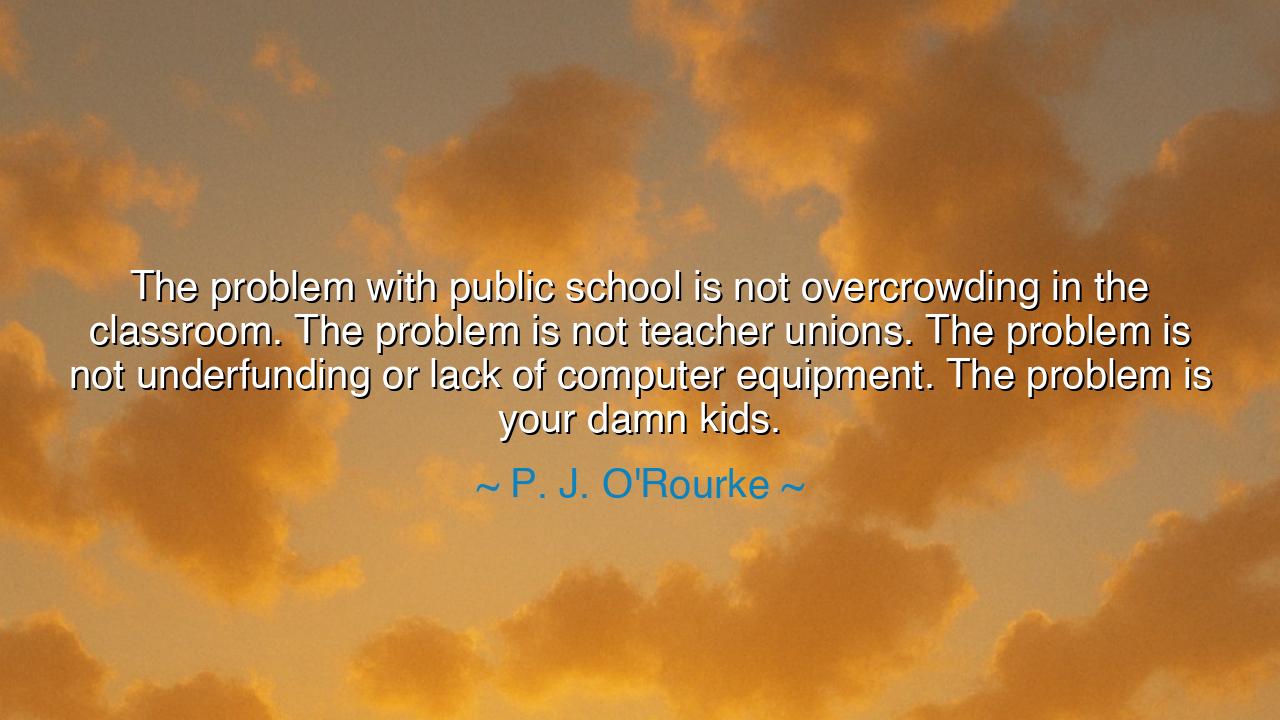
The problem with public school is not overcrowding in the
The problem with public school is not overcrowding in the classroom. The problem is not teacher unions. The problem is not underfunding or lack of computer equipment. The problem is your damn kids.






P. J. O’Rourke, with his biting humor and sharp tongue, once declared: “The problem with public school is not overcrowding in the classroom. The problem is not teacher unions. The problem is not underfunding or lack of computer equipment. The problem is your damn kids.” Though these words ring with satire, they are also rich with hidden wisdom. For in them is the reminder that no system, no matter how well designed, can succeed if the human heart within it is not willing to be shaped. The machinery of education may be smooth or flawed, but its true outcome rests upon the will, discipline, and spirit of the students themselves.
The ancients knew this truth well. Socrates taught not in schools filled with scrolls or tools, but in the marketplace, under the open sky. He asked questions, stirred minds, and yet even then, many resisted him. The problem was not the lack of resources, nor the absence of buildings, but the readiness of the young to wrestle with truth. In O’Rourke’s jest, we hear a timeless echo: a school can have books, computers, and teachers aplenty, but if the students are unwilling to learn, all such wealth is wasted.
We may think also of the Spartans, who trained their children not with luxuries, but with hardship. Their greatness did not come from abundance of equipment, but from the fierce discipline and resilience instilled in their youth. Contrast this with later Athens, where rhetoric and indulgence sometimes made students clever in words but weak in character. Thus, it is not the classroom that determines the strength of a people, but the resolve of the young who sit within it.
O’Rourke, in his satirical fire, turns the blame away from governments and teachers, pointing instead to the heart of the matter: character. A child who mocks learning, who scorns discipline, who delights only in distraction, will undermine even the greatest of systems. A child, however, who hungers for knowledge, who respects their guides, and who endures challenge with courage, will rise even from the humblest of schools. The wealth of education is not in bricks and mortar, but in the spirit of the learner.
This does not absolve society of its duty to provide resources and just conditions for teachers. Yet it reminds us that the student is not a passive vessel, but an active flame that must choose to burn. If the young refuse to engage, if they rebel not in noble questioning but in thoughtless resistance, then no union, no funding, no computer can save them from their own folly. O’Rourke’s humor is harsh, but his message is enduring: responsibility cannot be outsourced. It lies, ultimately, with the one who learns.
The lesson is this: if you would see schools flourish, raise up children with the virtues of discipline, humility, and curiosity. Parents must teach reverence for learning before the classroom door is ever crossed. Communities must prize wisdom more than ease, respect more than entertainment. And students themselves must be reminded that their destiny lies not in gadgets or facilities, but in the daily effort of mind and heart.
Practical steps follow. Parents, speak with your children about the dignity of learning. Do not let them despise effort. Teachers, inspire as much as you instruct, awakening the inner will of your students. And students, hold yourselves to account: do not wait for perfect conditions, but strive even in imperfect ones. For the greatest minds of history — Epictetus, born a slave; Abraham Lincoln, learning by firelight — achieved not because their classrooms were ideal, but because their hunger for knowledge was unstoppable.
Thus, O’Rourke’s jest is more than laughter. It is a mirror held to our age. “The problem is your damn kids.” Behind the humor is a cry for responsibility: that each generation must shape its young to value learning, or else no structure will stand. Let us, therefore, raise up students who do not curse their schools, but honor them with diligence — for in their hands lies the strength of the future.






AAdministratorAdministrator
Welcome, honored guests. Please leave a comment, we will respond soon